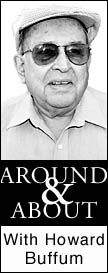 PROPHETIC 'CAL' - On May 1, 1919, Massachusetts Gov. Calvin
Coolidge vetoed a bill "relative to the use of voting machines."
The governor's veto message concluded: "The machinery of elections
needs to be simplified rather than further complicated."
PROPHETIC 'CAL' - On May 1, 1919, Massachusetts Gov. Calvin
Coolidge vetoed a bill "relative to the use of voting machines."
The governor's veto message concluded: "The machinery of elections
needs to be simplified rather than further complicated." PROPHETIC 'CAL' - On May 1, 1919, Massachusetts Gov. Calvin
Coolidge vetoed a bill "relative to the use of voting machines."
The governor's veto message concluded: "The machinery of elections
needs to be simplified rather than further complicated."
PROPHETIC 'CAL' - On May 1, 1919, Massachusetts Gov. Calvin
Coolidge vetoed a bill "relative to the use of voting machines."
The governor's veto message concluded: "The machinery of elections
needs to be simplified rather than further complicated."
DON'T MISS IT! - There's a fantastic yard display at the home of Lois and Jim Loucks on 85th Street. The central theme is the creche with life-size, clothed mannequins. There are also big palm trees, and this season Lois added three life-size camels. Where's 85th Street? If you're up by Island Park, continue north on U.S. 77 over the bridge and take the next right. The road goes east a quarter mile and then turns north. You'll see the lights as you head northerly.
SERVED WITH MCCOMAS - From longtime farmer/cattleman George Meacham of Clinton, Okla., comes word that he was in the first class of aviation cadets to go through training at Strother Army Air Base, Winfield. He says he "also came into close association with Col. McComas in China" but "never knew until I read this report that he was from Winfield." The "report" he mentions is the current issue of Jing Bao Journal of the 14th Air Force Association and its reprint of the Around & About column featuring McComas' exploits which ran in the Aug. 5 Courier.
George was attached to Ed's fighter squadron. "One particular time," he recalls, "we were being debriefed after a mission when a thunderstorm began. Ed was using a field telephone as he stood next to me when it was struck by lightning. He was not seriously hurt but badly shaken.. I had a lot of respect for his judgment, and he assigned me to lead many combat missions in the P-40s we were all flying at that time... I saw him one more time back in the States when he visited a P-51 school where I was an instructor shortly before the war was over. He seemed surprised that I had no ambitions other than to be a civilian when the war was over .... I am happy that Ed is memorialized in your Cowley County museum. He is fully worthy of that honor."
MCCOMAS' EARLIER YEARS - On the evening of June 28, 1932, young Ed McComas gave a piano recital at Southwestern's School of Fine Arts. Also taking part in the program, as reader, was 8-year-old Genevieve Daves. Ed was a pupil of Fern Dielmann, and Genevieve was an elocution pupil of Fern's sister, Edith Dielmann. It was quite common in that era for readings to be presented during music programs. Two of the readings presented by Genevieve were "The Trials of School Life" and "The Burglar."
This interesting tidbit arrived on J.J. Banks' e-mail from Laura Greene, daughter of the late Dr. Faye Greene and Genevieve (Daves) Greene. J.J. also shared this with Bob Davis and this was Bob's response:
"Fern Dielmann was my piano teacher in the '40s. If I remember correctly, she always had her red hair braided up, Scandinavian style. Gave lessons both in her home up near Southwestern College on 5th or 6th street and in the small auditorium above the Regent Theater (old opera house). Sister Edith devoted more to drama and elocution, if ancient memory serves well. Fern used a small ruler to slap my fingers if I didn't keep them properly "curled" while striking the piano keys."
(For the education of more recent Winfield residents, like myself, Bob Davis is an elder brother of Winfield's Jim, a retired Army first sergeant of 26 years' active duty and now 18 years with U.S. Civil Service with the Army in Fort Lee, Va. He is a military historian.)
MEMBER OF THE BOARD - Jerry Wallace, archivist/historian at Southwestern College and former archivist with the National Archives in Washington for nearly 30 years, is an active member of the board of directors of the Calvin Coolidge Memorial Foundation of Plymouth Notch, Vt. Among its many functions, it owns and maintains the Union Christian Church at the presidential site. The foundation was established in 1960 and now has more than 800 members. It just recently posted a new Web site with a wealth of material on our 30th president. Take a look at www.calvin-coolidge.org.
WINFIELD'S STREETS - Before bricks came into widespread use, some Winfield streets were macadamized. An old Courier item reports that on Oct. 20, 1887, the city council passed a resolution to macadamize Main Street from the Southern Kansas Railroad track south to Fourteenth and provided for a special tax levy to pay the costs. This, the article states, would be the first paved street improvements in the city. Macadamizing consisted of compressing small crushed rock, or gravel, and binding it with cement or asphalt.
(Column note: While researching Courier microfilm for material on Southwestern, Jerry Wallace uncovered much information pertaining to Winfield's early-day streets. We're grateful to him for sharing it, and from time to time we'll pass some highlights on to our readers.)